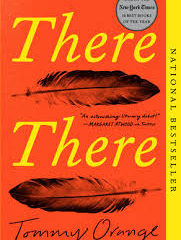My journey to bring in contemporary literature from a different perspective than the monolithic racial identity of authors dominating our curriculum turned out to be more of a whirlwind than I expected: I submitted the book for District approval back in September, gained my principal’s support to purchase copies of the novel, and received official District approval in time to integrate the book into my sequence in November.
Now it is December, and already my seniors have wrapped up their final projects from our reading of There There by Tommy Orange.
In part because of the accelerated nature of my school’s schedule, we tore through the novel at breakneck pace, engaging in regular discussion and frequent journal writing. Like any time teaching new content, there were hits and misses. My overall mission was two-fold: One, expose students to a work of literary merit that offered voices and perspectives otherwise not present in their school experience, and two, examine the craft and structure of the novel itself in order to consider different approaches to storytelling.
My students’ responses were interesting. As with any book I’ve tried to teach, there is always a subset of kids who see themselves as “bad readers” and whose default position is to approach with skepticism and negativity. This identity is often quite crystallized by the time the reach me as 17-, 18-, or 19-year-old high school seniors. I’ve yet to find the right way to reach every student with a given text, but the boundaries of who connects and who doesn’t shift in interesting ways.
A few of my students who regularly label themselves “bad readers” engaged quickly and heartily with There There. For a couple of students in particular, they connected strongly with the first character we meet: Tony is in his early 20s, has Fetal Alcohol Syndrome, which he calls “The Drome.” Tony has spent his life balancing a good heart (which he uses to care gently for his aging grandmother) and a short fuse (which sends him into moments of rage uncontrollable and violent). In early journals, many students immediately identified with the complexity of Tony’s character. In him they saw shades of themselves: for some, a heart complicated by raw nerves, for others, a kid stuck behind a mask (his FAS) that defines the way the world treats him. Because of seeing themselves in characters like Tony, Orvil, Jacquie, or Octavio, many of my students who usually greet books with “I don’t read” ended up admitting that though the didn’t read every part, they read more of this book than any other book they’d been assigned in school. I count that as a victory.
For many other students, the interconnected storylines of characters in some way searching for their personal and cultural identity struck a chord. Through their writing, many students of color shared the challenges of feeling invisible in our predominantly white community. Many of my white students shared thoughtful reflections about how race and culture are considered “other” or “exotic,” rather than characteristics that every human possesses…and how this “othering” can manifest as broader oppression. In particular, Orange’s prologue and interlude essays in the novel struck a deep chord, as these step out of the story narrative to give a brutal reality check to white hegemonic historytelling.
These conversations and writings were but one part of our literary study. We spent significant time exploring the development of numerous other themes, as well as exploring the form and structure of the novel, from it’s nonlinear structure to Orange’s employment of distinct style and syntax for deliberate effect.
The work is not finished even though we’ve wrapped the book unit. I’ll chalk this as a moderate success: using There There as a way to offer kids both a mirror on themselves as well as a window into the worlds of others started conversations we otherwise wouldn’t be having. My ongoing challenge: How to continue leveraging literature to foster kids’ ability to feel the world as other people feel it.

I’ve been thinking about windows and mirrors a lot lately. I can certainly relate to your context. I have a lot of self-proclaimed nonreaders, and it is a victory, albeit small, whenever they enjoy a text. Keep up the important work you are doing, Mark.